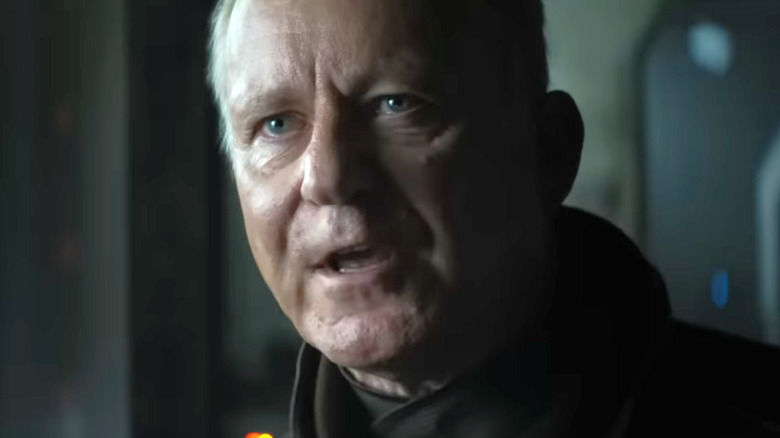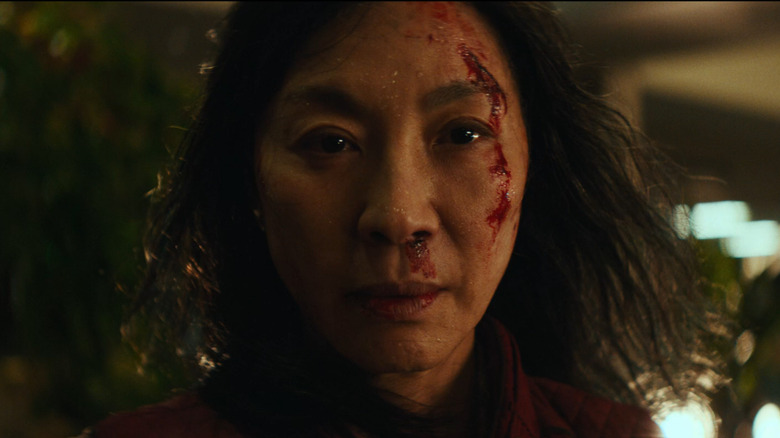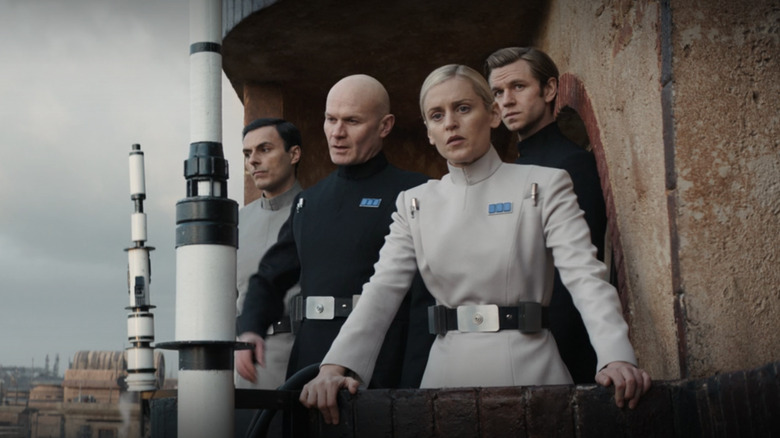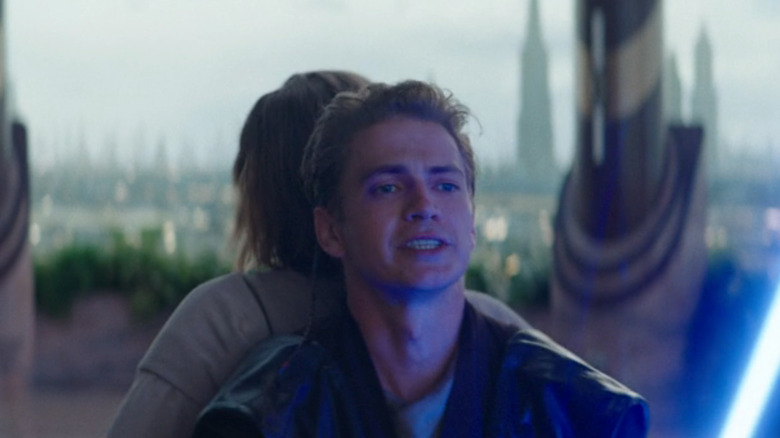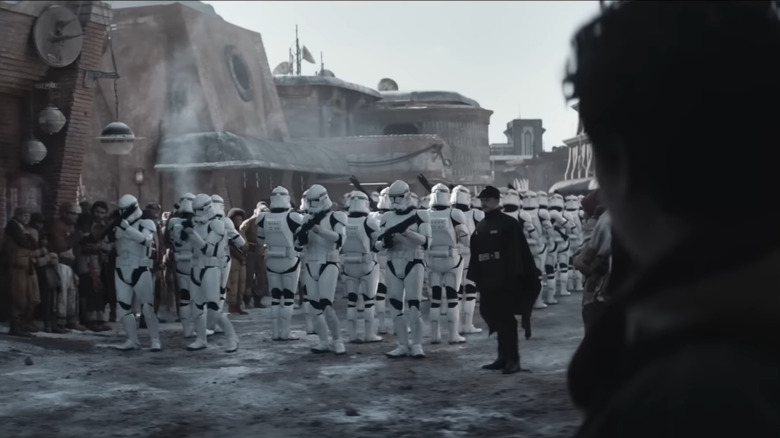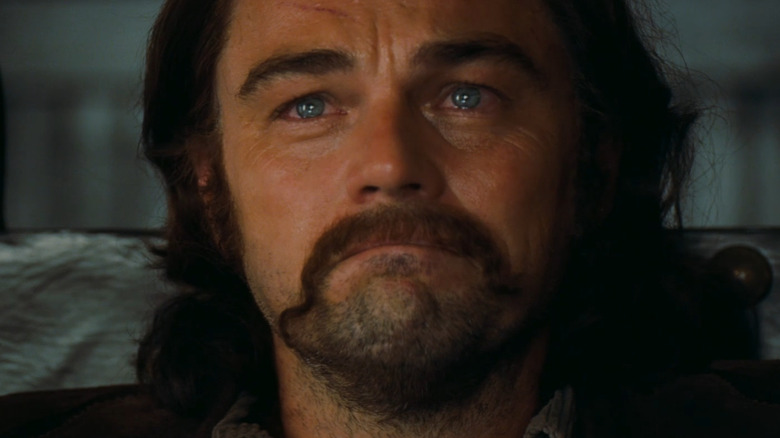Andor's Lack Of Buzz Proves Franchise Fatigue Is Real
Franchise fatigue is a pair of words we're fatigued of hearing. It seems that every time a lackluster, bloated, rewritten, and reshot project pushed out with a major franchise name attached fails, we have the same conversations. Are people finally getting tired of franchises? Do they want (and please read this in the voice of an obnoxious film bro) real cinema? In the wake of "Andor," the latest "Star Wars" series on Disney+, we may finally have an answer.
In general, debates about franchise fatigue boil down to a few people who don't enjoy such projects, hoping the trend will die and clinging to any scrap of evidence suggesting it might be on the way out. But the truth is that people desire quality entertainment, no matter what the name on the box is. Having a franchised name attached to that entertainment gets people in the door, but to keep them coming, you need to have actually made something worth watching.
Nothing fits that bill like "Andor," the best "Star Wars" project of the Disney era, even eclipsing George Lucas's original trilogy in many aspects. In theory, it should have been a runaway success. Instead, it flopped like a wet fish, leaving those singing its praises to shout them from the rooftops into a void of apathy.
That failure is proof that franchise fatigue is finally here to stay, and it begins with "Star Wars." But it didn't have to be this way. Like the Westerns before them, franchises got too comfortable with their cultural hegemony and wore out their welcome by wasting their vast resources on consistent mediocrity while refusing to adapt to the times. The genius of "Andor" is too little, too late.
Good entertainment succeeds, regardless of franchise power
As an illustrative example, look at the successes of "Everything Everywhere All at Once" and "Spider-Man: No Way Home." The latter is the most franchise ever franchised in a franchise movie and made 20 times more money than the former ($1.9B against $103M), but it also cost eight times more to make ($25M against $200M). But what nearly everyone agrees on is that both were very good movies. The promise of triplicate Spider-Men may have ensured that "No Way Home" would dominate, but it wouldn't have soared to victory as the third biggest movie of all time if it had turned out to suck. And while "Everything Everywhere" had big-name draws in Michelle Yeoh and Ke Huy Quan, it was the sheer visionary quality of the film that kept it in theaters for months longer than anyone anticipated.
When audiences didn't show up for "Justice League" in 2017, it wasn't because they were sick of Batman or Wonder Woman, but because the movie was the latest in a series of terrible DC projects. And since 2020, any speculation about franchise fatigue had to factor in the COVID-19 pandemic that made people wary of theaters, even after most safety restrictions had been lifted. The box office still has not recovered to pre-pandemic levels, which is something Disney CEO Bob Iger admitted may never happen (via CNBC). Further, the franchise fatigue discourse often erupts when a film or television show does anything less than set industry records. Did "Black Widow" flop? That depends on how much money you think $379.8 million is (hint: more than most of us will see in a lifetime).
With all of that in mind, what happens when a franchise project is not only good, but great, doesn't require a trip to the theater, and still underperforms? Enter "Andor."
Andor might be the best Star Wars ever, and it failed nonetheless
"Andor" is handily the best live-action "Star Wars" show to emerge from the Disney+ streaming machine. We'd go so far as to say it's the best since the original trilogy. A bold claim? Bolder than black coffee. But it's hardly a minority opinion. Critics and fans mostly agree on that count, as do commentators from The New York Times, WIRED, Collider, Time ... we could spend the rest of this writing listing the show's accolades.
"Andor" is ambitious in a way many of the franchise's Disney-era projects just haven't been, diving into the dire political straits the galaxy finds itself in at the height of Imperial control and finding a moral gray area for its characters to inhabit. Speaking of those characters, "Andor" has a barnstorming cast. Diego Luna plays Cassian Andor as a man constantly looking over his shoulder, while Stellan Skarsgård imbues the rebel leader Luthen Rael with a burning passion that informs his lack of ethics as he crusades against the Empire. It's also beautifully rendered, with physical sets, practical effects, and more.
But "Andor" underperformed compared to previous Disney+ "Star Wars" shows. It sagged so hard that "Star Wars" commentators have been running a grassroots campaign begging people to give it a chance. Even late-night host Seth Meyers diverted his monologue into a stump speech for the show this week. Meanwhile, in an unusual move for the company, Disney has made the first two episodes of the series available on Hulu and its legacy broadcast cable channels, presumably to draw in more viewers.
Showrunner Tony Gilroy and his team clearly put a great deal of care into crafting something that would stand on its own, a heartbreaking tale about what it means to join a cause larger than yourself. So why didn't people watch it?
Twice burned, Star Wars fans are thrice shy
The Disney company, over the years, positioned itself in the market for an era of entertainment defined by shared-universe franchise storytelling. For over a decade, that strategy worked like a money printer. The MCU rode roughshod over most of its cape flick competition at the box office, and "Star Wars" movies were guaranteed gold tickets for Mickey's bottom line. Even a widely reviled misfire like "Rise of Skywalker" grossed a billion dollars globally. But the misfires kept on coming.
In truth, only franchises themselves can induce franchise fatigue — and mostly by releasing a string of lackluster installments. Remember how much hype surrounded "The Book of Boba Fett"? What about "Obi-Wan Kenobi"? Diehard "Star Wars" fans salivated over finally getting to see new stories told about some of their favorite characters, but when those shows finally made it to air, the glitzy packaging was stripped bare to reveal a hollowness underneath. Yes, we were finally getting more than a few lines of dialogue out of Boba Fett (Temuera Morrison), but instead of the deadly bounty hunter fans love, we got a guy going on an ayahuasca trip in the desert and deciding to be a nice guy. Then "Obi-Wan" rolled around and, sure, Ewan McGregor is always a blast, but amid the lifeless, digital set pieces and hackneyed scripts, even he couldn't save the miniseries from feeling underwhelming.
Which brings us to "Andor." After back-to-back disappointments, is it any wonder fans have begun to ignore the constant barrage of content? If you were given gas station sushi twice in a row, then offered Nobu sushi by the same person, you'd be forgiven for assuming it came from the gas station again. Especially when you know you're getting "Ahsoka"- and "The Mandalorian"-flavored sushi in just a few months.
Franchise fatigue is here, and it starts with Star Wars
While there's certainly something to be said for much of the criticism levied against the entertainment giant, it's nothing short of poetic to watch venerated directors from the previous generation of filmmaking lose their marbles over the success of these franchises as if the presence of Rocket Raccoon in our cultural imagination portends the death knell of "real cinema."
And yet, even as naysayers say their nays, warning signs have cropped up that may signal the beginning of the end for the franchise era. Marvel's Phase 4 movies have struggled at the box office compared to those from Phase 3. For example, apart from "Spider-Man: No Way Home," all of Marvel's theatrical releases fell short of $100 million on opening weekend. Judging movies by how much money they make for their studios or TV shows in terms of viewership might not be the best way to assess art, but it's what determines which projects get funding next, and it gives us a rough estimate of popularity.
If franchise fatigue has finally arrived for good, the underperformance of "Andor" maybe its calling card. But to quote one of Disney's early hits, all of this has happened before, and it will all happen again.
Before George Lucas conceived a lightsaber, back when superheroes were relegated to comic book pages, Westerns dominated the box office. For a time, they were as ubiquitous as Captain America is today, with figures like John Wayne paralleling the Robert Downey Juniors of our time. And then, without any great fanfare, the genre went the way of the dinosaur. Franchises are about to find out what that feels like.
Franchises are the new Westerns, and are damned to the same fate
The decline of the Western was influenced by multiple factors, chief among them a changing sense of American identity. Art addresses the fears and hopes of its time, and when that art has its finger on the zeitgeist's pulse, it often catches on like wildfire. In the heyday of the Western, America was high on the fumes of continental conquest, having established itself from sea to shining sea. The cowboy was the icon of that expansionary period, a virile and independent figure of rugged American masculinity and individualism who set out into the rugged wilderness and tamed it under his spurs. Never mind the historical revisionism present in that narrative. The cowboy was a myth we wanted to believe in, and the Western made it believable.
The franchise movies of our time fill that same need for self-mythologizing. In an era of American exceptionalism and military might, the Avengers are avatars of our global hegemony, able to deploy around the world to defeat catastrophic threats. "Star Wars" is a dark mirror of that paradigm, a universe in which the all-encompassing Empire is a demonic threat to freedom everywhere. Lucas modeled the Empire on Vietnam-era America, then later updated that metaphor for the Iraq era with his prequel trilogy. But since being acquired by Disney, only "Andor" has bothered to update the franchise for our current times.
But times are changing. As the country enters another recession during a still-ongoing global pandemic, our mythology will change with us. The narrative power of superheroes and "Star Wars" will continue to lose its sheen. Franchise fatigue may be nothing more than a synonym for new opportunities to tell the stories we need most.
With that said, we beg of you: watch "Andor."
